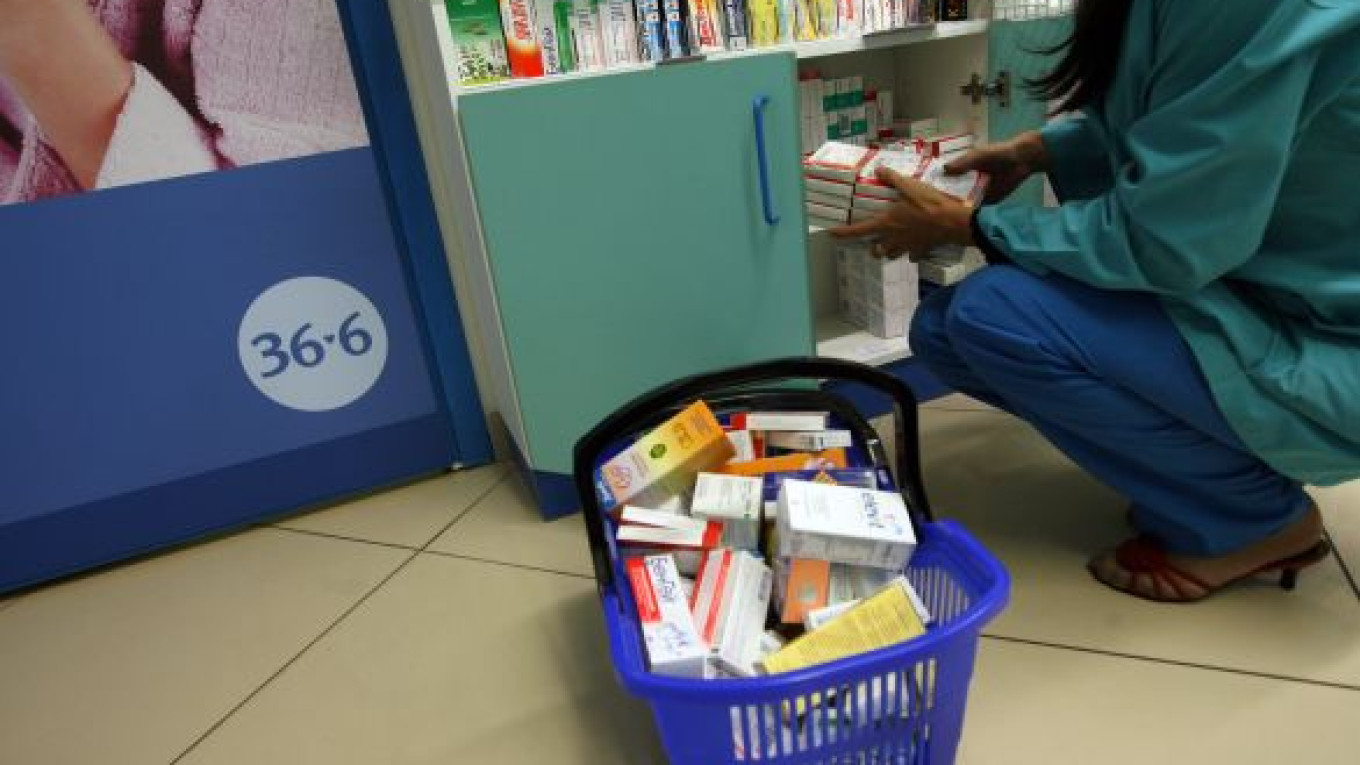The government began restricting markups for essential drugs Thursday in a change that will reduce profit margins on a large segment of the multibillion-dollar market.
Prime Minister Vladimir Putin issued a stern warning for governors to enforce the new pricing rule, which came in response to a surge in prices last year that angered many Russians.
"I want to warn regional heads that if some regions don't mange to hold on to the parameters that have been set, it will be a noticeable black mark for these heads," he said Thursday at a meeting about the measure.
Under the rule, regional authorities will each set a limit for wholesale and retail markups on imported drugs, on top of the price declared at customs. For domestically produced drugs, the markup will be calculated from the producer's price.
The Health and Social Development Ministry has drawn up a list of essential drugs, which make up a third of the market, and has been collecting price statements from producers since the beginning of this year. So far, the ministry has registered 98 percent of producer prices for essential drugs, Minister Tatyana Golikova said.
Pharmacies in Russia changed their price tags in accordance with the new pricing policy without any major disruptions to their work, said David Melik-Guseinov, director of market researcher Pharmexpert. Even so, he warned that cheap medicine could disappear from the shelves.
"Regulated prices might not allow for normal profits," he said.
The government ordered the measures last year after the ruble's devaluation dramatically reduced consumers' purchasing power. Imported medicines account for 80 percent of the market in terms of value, according to an estimate given by Putin last year.
Prosecutors have threatened to launch criminal charges and withdraw licenses after discovering that markups on some drugs reached 380 percent in a nationwide probe last year. Average drug prices increased by 47 percent over the first 10 months of the year, prosecutors said in November, while the ruble lost about 30 percent of its value.
Some manufacturers conceded that the drug sales market had enjoyed an exceptionally favorable environment in Russia.
"We have had, as an industry, a very good seven to eight years," Swiss drug maker Nycomed's chief for Russia, Jostein Davidsen, said at a recent pharmaceutical conference. "Profit margins here have been higher than in all other emerging markets."
"It cannot last," he added later on the sidelines of the event that discussed the implications of the new rule.
But at least some international market players are still game. Finland's wholesale and retail distributor Oriola-KD Group announced expansion plans last week after it increased its ownership of two Russian subsidiaries to 100 percent in February.
The company — which operates the Stary Lekar chain of 175 pharmacies, Moscow's third largest — saw the most significant improvement in its operations to take place in Russia, its chief executive Eero Hautaniemi said in an annual report released last week.
It wants to open new distribution centers this and next year to cover the entire Russian market, he said.
A Message from The Moscow Times:
Dear readers,
We are facing unprecedented challenges. Russia's Prosecutor General's Office has designated The Moscow Times as an "undesirable" organization, criminalizing our work and putting our staff at risk of prosecution. This follows our earlier unjust labeling as a "foreign agent."
These actions are direct attempts to silence independent journalism in Russia. The authorities claim our work "discredits the decisions of the Russian leadership." We see things differently: we strive to provide accurate, unbiased reporting on Russia.
We, the journalists of The Moscow Times, refuse to be silenced. But to continue our work, we need your help.
Your support, no matter how small, makes a world of difference. If you can, please support us monthly starting from just $2. It's quick to set up, and every contribution makes a significant impact.
By supporting The Moscow Times, you're defending open, independent journalism in the face of repression. Thank you for standing with us.
Remind me later.


